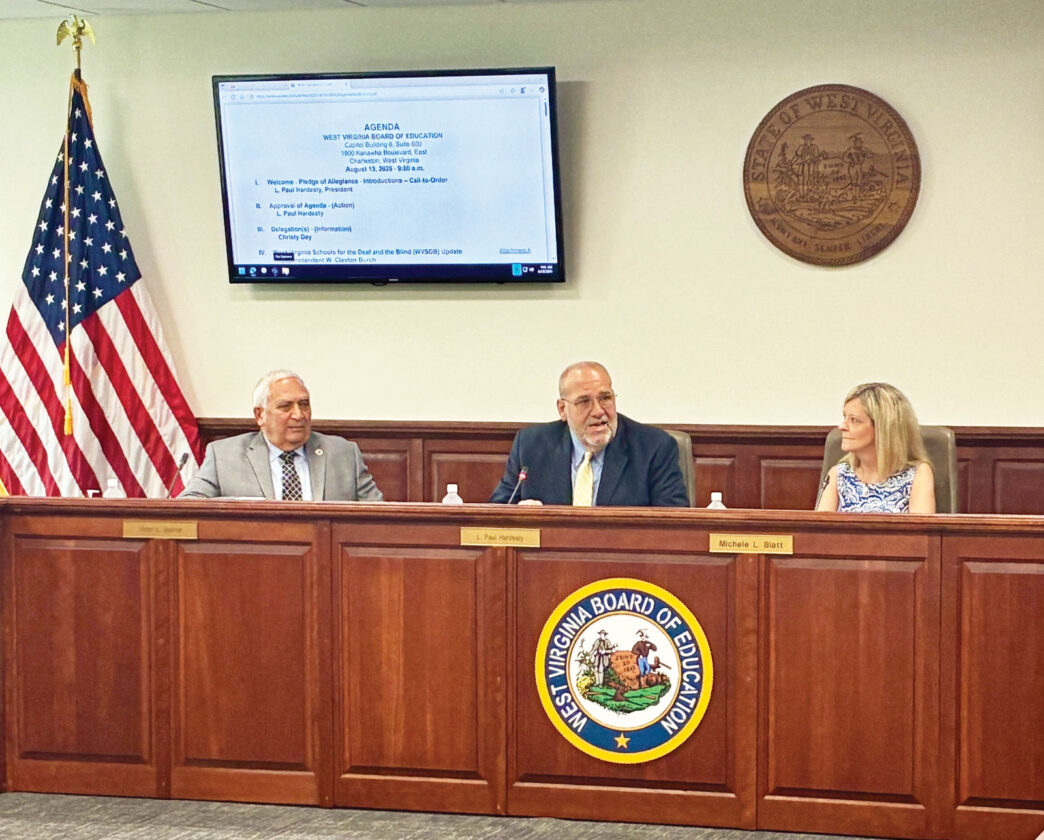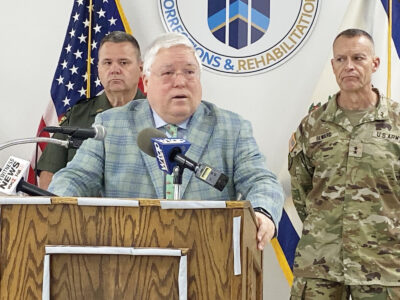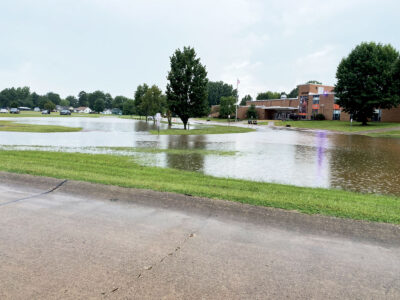West Virginia BOE prepared to appeal religious vaccine exemption injunction to state Supreme Court

West Virginia Board of Education President Paul Hardesty, center, said Wednesday that he would abide by whatever decision the state Supreme Court of Appeals would come to regarding the state’s compulsory vaccination law. (Photo by Steven Allen Adams)
CHARLESTON — With high school football beginning, the West Virginia Board of Education is also prepared to suit up to take on an injunction over the state compulsory immunization law for school-age children at conflict with an executive order by Gov. Patrick Morrisey allowing for religious exemptions. Speaking prior to the start of the state board’s meeting Wednesday morning, state board President Paul Hardesty likened the fight to a high school football game. “It’s football season and at the start of a football game, they go to midfield, they have a coin toss, and two options are on the table. You can either kick off or you can receive,” Hardesty said. “For the past couple months, this board’s been on the receiving end of some very harsh criticism, undue I might add. So, today I think I’m going to kick off.” A Raleigh County circuit court judge granted a preliminary injunction in July. That ruling prevents the state board and the Raleigh County Board of Education from enforcing State Code 16-3-4, West Virginia’s compulsory vaccination law, for three parents that were granted religious exemptions by the state Department of Health per Morrisey’s Executive Order 7-25. State code requires children attending school to show proof of immunization for diphtheria, pertussis, tetanus, polio, measles, mumps, rubella, varicella and hepatitis B unless proof of a medical exemption can be shown. But Morrisey issued an executive order in January, allowing for religious and conscientious objections to the state’s school vaccination mandates due to the Equal Protection for Religion Act, passed in 2023. In a social media post Wednesday afternoon, Morrisey said he was prepared to support any parents seeking religious exemptions and rigorously defend his executive order. “I want every family seeking a religious exemption to the radical state school board policy to know that we have your back and will ultimately win this fight,” Morrisey said. “The school board is ignoring the religious freedom law and trying to make West Virginia an extreme outlier on vaccine policy.” Despite a bill that failed during the recent 2025 legislative session to add a religious exemption to the state’s compulsory vaccination law, Morrisey’s executive order allowed the Department of Health to grant applications from parents for religious exemptions in order to attend public and private schools this fall. The executive order required the commissioner for the Bureau of Public Health/state health officer to establish a process for parents/guardians to request religious or philosophical exemptions to school-age vaccines, only requiring a request in writing from the parent/guardian. The Governor’s Office released guidance in May to schools and parents seeking vaccine exemptions. However, the state Board of Education voted in June to require State Superintendent of Schools Michele Blatt to issue guidance to county school systems that they follow the compulsory school vaccination law that does not permit religious exemptions. Raleigh County parent Miranda Guzman filed a lawsuit in June on behalf of her child seeking an injunction against the state Board of Education, State Superintendent Blatt, and the Raleigh County Board of Education. Two other parents – Amanda Tulley and Carley Hunter – later joined her lawsuit. That lawsuit was supported by Morrisey, who attended the June press conference announcing the Raleigh County lawsuit, and leveled criticism at the state board for defying his executive order. “You have an unaccountable set of bureaucrats in the school board that’s trying to take matters into their own hands. That’s unacceptable to me,” Morrisey said in June. “I fully support Miranda’s ability to seek a religious exemption, and I support her lawsuit against school board bureaucrats. Remember, this is the politically unaccountable board who are trampling on her religious freedoms.” “This board has been referred to as a group of unelected bureaucrats by the chief executive over the immunization issue,” Hardesty said Wednesday. “I take offense to that. We are appointed by a governor. We are confirmed through the advice and consent of the Senate. Two branches of government, a checks and balance system that vets each one of us before we take these seats.” Hardesty pointed out that West Virginia’s compulsory vaccination law has been in State Code since the 1930s. Hardesty said it will be up to the third branch of government – the judicial branch – to decide whether the 2023 Equal Protection for Religion Act allows Morrisey to use his executive order power to allow for a religious vaccine exemption. “Who’s right? Who’s wrong? I don’t know, ladies and gentlemen. I really don’t at this point,” Hardesty said. “I can tell you this with 100% certainty: the chief executive does not have the right or the ability to perform the judicial branch of government’s function. “Whatever decision (justices of the state Supreme Court) render, I may like it, I may not, but I can assure you with everything in me, this board will comply with their decision,” Hardesty continued. “We’re not going to comply with an executive order that’s in conflict with a 1937 law. We can’t do that. We’ve been advised by our counsel not to do that.” During his remarks, Hardesty urged Morrisey to remain professional as the matter goes through the court system. Though Morrisey double-downed on criticizing the state board in his social media post. “I respect Governor Morrisey. I respect the office he holds,” Hardesty said. “Let’s be professional. Let’s stop the name calling and let the proper branch of government decide the issue.” “I recognize that the Board is creating hardships for families, but we will keep pushing,” Morrisey said. “Religious freedom is a cornerstone of our constitutional system and required under state law – we will eventually defeat this politically unaccountable board. Nine-year board terms are too long and need to be reconsidered.” A hearing to grant a permanent injunction has been set for Raleigh County Circuit Court for Wednesday, Sept. 10, though an appeal by the state board to the Supreme Court would likely pause that hearing pending an outcome. The state board also voted Wednesday for a motion to require the state’s in-person and virtual public charter schools to abide by the compulsory immunization law. During its regular virtual meeting last week, Professional Charter School Board Director James Paul said he would continue to provide guidance to public charter schools to exempt any student from the required immunizations if their parents submit a letter from the state Department of Health approving an exemption. Steven Allen Adams can be reached at sadams@newsandsentinel.com.





